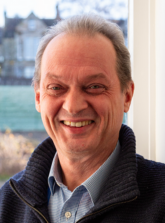
Year of Election
Division
Nationality
Country/Region of working/living
City
Institute
CV
2024
Mathematics Division
Scottish
Scotland
St Andrews
Mathematical Institute, University of St Andrews
Mark AJ Chaplain is currently the Gregory Chair of Applied Mathematics at the University of St Andrews, St Andrews, Scotland. His main area of research is multiscale mathematical modelling of cancer growth and treatment and he has an international reputation in this field, having carried out pioneering work in this area since the late 1980s. He has developed a variety of original and innovative mathematical models for all the main phases of solid tumour growth (avascular, tumour-induced angiogenesis, vascular, invasion); cancer treatment (immunotherapy, chemotherapy, radiotherapy, thermotherapy); gene-regulatory networks associated with cancer (Hes1, p53, NFκB); and most recently has developed a framework to model the metastatic spread of cancers. Throughout his research career he has undertaken collaborative, interdisciplinary re- search with colleagues in biochemistry, developmental biology, cancer biology, and clinical oncology. He has developed highly original and novel mathematical models which have provided several new insights into the mechanisms underlying the growth of cancers and laid the foundation for developing novel potential therapeutic treatment strategies via personalised medicine.
In 2008, he was awarded a prestigious European Research Council Advanced Investigator (ERC AdG) award, “M5CGS: From Mutations to Metastases: Multiscale Mathematical Modelling of Cancer Growth and Spread”. a 5 year award, from September 2009 - August 2014. His research has been recognised through the award of several prizes over the past 25 years including a Whitehead Prize of The London Mathematical Society, July 2000; being elected a Fellow of The Royal Society of Edinburgh, March 2003; the recipient of a Leverhulme Personal Research Fellowship, April 2007 - 2009; the recipient of the Society for Mathematical Biology 2014 and 2023 Lee Segel Prize for the best paper appearing in the Bulletin of Mathematical Biology in the previous two years.
He has served as the Secretary and Treasurer of the European Society for Mathematical and Theoretical Biology (ESMTB), January 1998 – September 2002; President, The Society for Mathematical Biology (SMB), July 2005 – July 2007; and President, Edinburgh Mathematical Society (EMS), October 2011 – October 2013. He is currently President-elect of the London Mathematical Society and will take up his role as President in November 2025.
